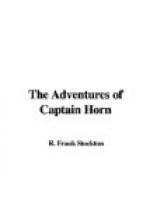When the Arato changed her mind about going to Callao, and sailed southward some five days after the Miranda had started on the same course, she had very good weather for the greater part of a week, and sailed finely. Cardatas, who owned a share in her, had sailed upon her as first mate, but he had never before commanded her. He was a good navigator, however, and well fitted for the task he had undertaken. He was a sharp fellow, and kept his eyes on everybody, particularly upon Nunez, who, although a landsman, and in no wise capable of sailing a ship, was perfectly capable of making plans regarding any vessel in which he was interested, especially when such a vessel happened to be sailing in pursuit of treasure, the value of which was merely a matter of conjecture. It was not impossible that the horse-dealer, who had embarked money in this venture, might think that one of the mariners on board might be able to sail the schooner as well as Cardatas, and would not expect so large a share of the profits should the voyage be successful. But when the storms came on, Nunez grew sick and unhappy, and retired below, and he troubled the mind of Cardatas no more for the present.
The Arato sailed well with a fair wind, but in many respects she was not as good a sea-boat in a storm as the Miranda had proved to be, and she had been obliged to lie to a great deal through the days and nights of high winds and heavy seas. Having never had, until now, the responsibility of a vessel upon him, Cardatas was a good deal more cautious and prudent, perhaps, than Captain Horn would have been had he been in command of the Arato. Among other methods of precaution which Cardatas thought it wise to take, he steered well out from the coast, and thus greatly lengthened his course, and at last, when a clearing sky enabled him to take an observation, he found himself so far to the westward that he changed his course entirely and steered for the southeast.
Notwithstanding all these retarding circumstances, Cardatas did not despair of overhauling the Miranda. He was sure she would make for the Straits, and he did not in the least doubt that, with good winds, he could overtake her before she reached them, and even if she did get out of them, he could still follow her. His belief that the Arato could sail two miles to the Miranda’s one was still unshaken. The only real fear he had was that the Miranda might have foundered in the storm. If that should happen to be the case, their voyage would be a losing one, indeed, but he said nothing of his fears to Nunez.
The horse-dealer was now on deck again, in pretty fair condition, but he was beginning to be despondent. After such an awful storm, and in all that chaos of waves, what chance was there of finding a little brig such as they were after?




